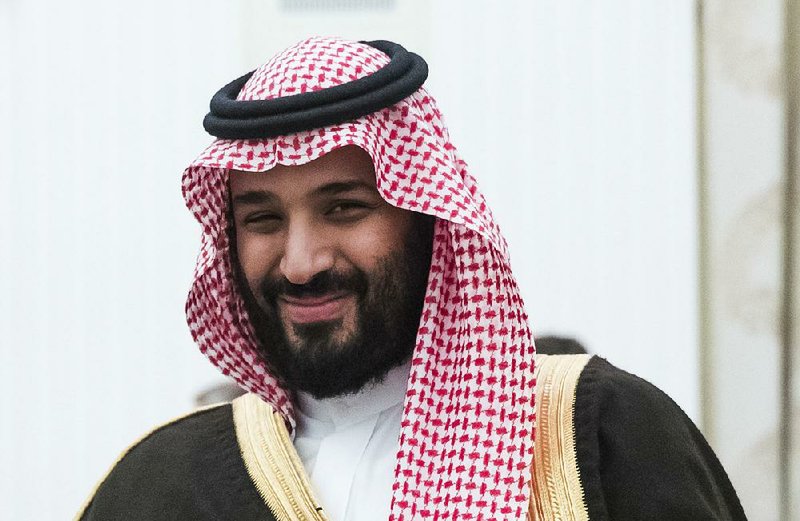CAIRO -- Saudi Arabia's crown prince said Tuesday that the ballistic missile launched at the kingdom by Yemeni rebels was a "direct military aggression by the Iranian regime," as the Saudi-led coalition ordered the closure of all ports and grounded all humanitarian flights to Yemen.
The military coalition, which has been at war with Yemen's Houthi rebels for more than two years, has tightened an air, land and sea blockade in response to the missile, which was intercepted near the capital, Riyadh, but marked the rebels' deepest strike yet into Saudi territory.
Crown Prince Mohammed bin Salman's remarks were carried by the Saudi Press Agency.
The kingdom has accused Tehran of supplying the missile fired toward Riyadh's international airport on Saturday night. Iran, which supports the Houthis but denies arming them, said it had nothing to do with the attack.
Saudi Arabia also put a $440 million bounty on the heads of 40 leaders of pro-Iranian Yemeni rebels. The individual rewards range from $5 million to $30 million, with the highest being offered for help in capturing rebel leader Abdulmalik Al-Houthi, according to a government statement on PR Newswire.
The government said the bounty for the Houthi leaders was meant to help eradicate terrorism and to counter the "increased terrorist activity by the Houthi group and its continuous endeavor to harm the kingdom's security with the support of the Iranian regime."
The U.S. ambassador to the United Nations, Nikki Haley, urged the Security Council to hold Iran accountable for a different missile that she said it had supplied to the Houthis in July. Haley said the missile used Saturday may also have been Iranian.
"The United States is committed to containing Iran's destabilizing actions and will not turn a blind eye to these serious violations of international law by the Iranian regime," she said. The U.S. supports the Saudi-led coalition.
U.N. spokesman Stephane Dujarric called on the coalition and the rebels to allow aid into Yemen, warning that "any further shocks to imports of food and fuel may reverse recent success in mitigating the threat of famine."
The escalation in Yemen added to already rising regional tension. Just hours before the missile was fired on Saturday, Lebanese Prime Minister Saad Hariri, a pro-Saudi Sunni politician, resigned in a speech from Riyadh, blaming Iran and the Tehran-backed Hezbollah group for destabilizing his country.
Thamer al-Sabhan, a Saudi minister, said his government will not accept Lebanon being a launchpad for pro-Iranian activities against the kingdom.
Saudi Arabia will treat the Lebanese government as one that's declared war because of Hezbollah, al-Sabhan told al-Arabiya television. "Saudis will take all political measures and more to confront Hezbollah," he said.
Yemeni officials, meanwhile, said suspected Saudi-led air raids killed at least 23 people in the rebel-controlled northern province of Hajjah. They said the strikes targeted homes of local sheikhs where the head of the Houthis' Supreme Political Council, Saleh al-Sammad, was visiting.
The dead included women and children, and at least three people were wounded, they added, speaking on condition of anonymity because they were not authorized to brief reporters. Houthi spokesman Mohamed Abdel Salam denied Saudi media reports that al-Sammad was killed.
Humanitarian flights to Yemen were grounded and ships ordered to leave, resulting in immediate price increases in the rebel-held capital, Sanaa. The move threatens to worsen an already devastating humanitarian crisis in the country, where fighting has killed more than 10,000 civilians and displaced 3 million.
A U.N. official said aid flights were canceled and that the U.N. was seeking "to resolve the issue as soon as possible."
The International Committee of the Red Cross urged the reopening of ports for medical supplies. The relief agency said a shipment of chlorine tables used to prevent cholera, which has ravaged Yemen in recent months, did not get a clearance at Yemen's northern border.
In announcing the closures earlier this week, Saudi Arabia said it would take into consideration continuing aid efforts.
The Houthis have nevertheless vowed to continue targeting Saudi Arabia as well as the United Arab Emirates, a key member of the coalition.
Col. Aziz Rashed, an army spokesman with a unit allied with the Houthis, warned travelers to stay away from Saudi and Emirati airports as they are considered "legitimate targets."
On Monday night, the head of the World Food Program warned that things will get worse with a prolonged, tightened blockade. David Beasley said his agency not only has trucks and planes grounded but also ships in the port of Hodeida. "The Saudi-led coalition is saying, 'Get them out,'" he said.
Information for this article was contributed by Maggie Michael and Edith M. Lederer of The Associated Press; and by Zainab Fattah of Bloomberg News.
A Section on 11/08/2017
